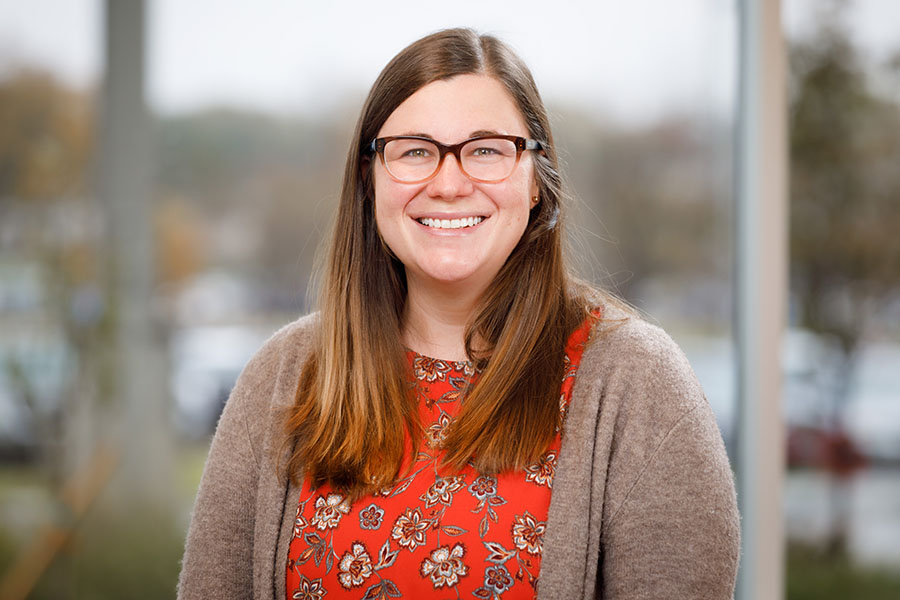Intensive Applied Behavior Analysis

The Munroe-Meyer Institute at the University of Nebraska Medical Center in Omaha, Nebraska invites applicants for its clinical postdoctoral fellowship in Intensive Applied Behavior Analysis.
Clinical Fellowship Opportunities
The integrated Center for Autism Spectrum Disorders offers multiple training opportunities.
Track 1: Diagnostic Track
Placement: Autism Diagnostic Clinic
(License eligible candidates only)
- FDA-Regulated Clinical Trial for Evaluating the Use of Eye-Tracking Devices in the Diagnosis of Children with ASD.
- FDA-Regulated Clinical Trial for the Monitoring of Treatment Effects.
- Evaluating a Virtual Reality-based Hair Cutting Simulator.
Track 2: Treatment Track (ACT Clinics, Early Intervention, BRIDGE Program)
(License-eligible or non-license eligible; BCBA credential required)
Multiple placement options and descriptions are included below.
Placement: Autism Care for Toddlers Clinics (ACT Clinics in Central and North Omaha)
- Supervisors: Mary Halbur, Regina Carroll
- Description: The Autism Care for Toddlers Clinics are community outreach programs dedicated to providing early intervention services using applied behavior analysis to children aged 2 to 6 years. Our team focuses on investigating components of early behavioral intervention and the involvement of treatment team members (i.e., caregivers, staff) in behavior analytic service delivery. The post-doctoral fellow will assist with many ongoing projects and work to develop their own lines of research, including conducting clinical evaluations at the clinics. The fellow will also assist iCASD faculty with supervising graduate students and/or staff members at the Autism Care for Toddlers Clinics and with the implementation of the behavior technician training. Additionally, the fellow may assist iCASD faculty with teaching graduate-level courses in behavior analysis. The fellow will participate in research and evaluations related to autism spectrum disorders and staff/caregiver training, as well as assist with writing grants for internal or external funding. The research and grants at the Autism Care for Toddlers Clinics are directly inspired by clinical and community-based needs. There will be opportunities to present at regional and national conferences and contribute to publications. Clinical responsibilities include providing early intensive behavioral intervention to young children with autism spectrum disorder in the Autism Care for Toddlers clinics and overseeing evidence-based behavior analytic interventions related to communication skills, reduction of challenging behavior, pre-academic skills, social skills, self-help skills, and play skills. The fellow may be responsible for managing approximately one to two clinical cases, which may also include caregiver training and collaboration with other departments at MMI (e.g., Speech Department, Occupational Therapy). The fellow will also assist with the development and implementation of community training and related community outreach programs. This position offers a unique opportunity to be actively involved in both the practical and research aspects of early behavioral intervention for children with autism spectrum disorder. The fellow will have the chance to contribute to the field of behavior analysis through clinical work, research, teaching and community outreach.
Placement: Early Intervention Program
-
Supervisors: Nicole Rodriguez, Catalina Rey
-
Description: In the Early Intervention program, children receive 1:1 direct instruction tailored to meet their individual needs. This program focuses on early learners with autism spectrum disorder, providing intensive and individualized applied behavior analysis services to foster essential developmental skills. The focus areas include communication, social skills, play skills, and adaptive behaviors, using evidence-based treatments. Fellows in the Early Intervention program will gain both clinical and research experience. Clinically, Fellows will manage cases of children with autism spectrum disorder in a multidisciplinary setting, develop skills in supervising more junior clinicians and trainees across various educational levels and disciplines, and conduct various assessments. They will also provide caregiver training and collaborate with other service providers to ensure comprehensive care. In research, Fellows will participate in department lab meetings, offering opportunities to collaborate on applied and translational research projects, design research studies, conduct literature reviews, and mentor students involved in research. Fellows will be supervised by a doctoral-level board-certified behavior analyst, ensuring they receive the guidance and feedback needed to enhance their clinical and research skills in early intervention.
Placement: BRIDGE Program
- Supervisors: Sarah Connolly, Juliana Oliveira
- Description: In the BRIDGE program, children receive applied behavior analysis services in small groups of peers (two to three children), as well as opportunities to practice skills in larger group settings (up to seven children). Through play and naturalistic intervention methodologies, we aim to prepare children with the skills needed to build meaningful relationships and to learn in less restrictive environments. Fellows in the BRIDGE program will gain experience in case management of children with autism spectrum disorder receiving applied behavior analysis services within a dyad and small group context. Fellows will develop their skills in clinician supervision by supervising more junior clinicians and trainees across a range of educational levels and disciplines. They will gain experience conducting both norm-referenced and criterion-referenced assessments, caregiver training manualized curricula, and direct service delivery of various evidence-based curricula (Direct Instruction, Skillstreaming). Fellows will have opportunities for multidisciplinary collaboration and to engage in the peer review process. Fellows will participate in department lab meetings which include opportunities to collaborate on applied research projects conducted in BRIDGE, as well as various single case designs, randomized control trials, and systematic reviews across a range of areas related to autism spectrum disorder and skill acquisition (e.g., teaching social skills, direct instruction, verbal behavior, therapeutic rapport building). Fellows will be supervised by a licensed clinical psychologist, as well as a doctoral-level board certified behavior analyst.
Placement: Adolescent and Young Adult
- Supervisor: Todd Owen
- Description: The adolescent and young adult services track provides treatment for individuals with autism across several skill areas via 1:1 and group instructional formats. Areas of focus may include social skills, vocational training, and independent living skills. Fellows will gain experience in case management of young adults with autism spectrum disorder receiving applied behavior analysis services, providing clinical supervision to pre-doctoral interns, and direct service provision to individuals receiving services as well as caregivers and other stakeholders. Fellows will have opportunities to participate in the peer review process, assist on applied research projects, and collaborate with professionals in various fields. Fellows will be supervised by a doctoral-level board certified behavior analyst.
Placement: Clinical Research Fellow
- Supervisor: Alice Shillingsburg
- Placement Description: The Integrated Center for Autism Spectrum Disorder offers diagnostic and treatment services for children with autism. iCASD consists of a diagnostic clinic and several applied behavior analysis clinics providing one on one and small group interventions to teach meaningful skills. As a clinical research fellow, trainees will have the opportunity to participate in a variety of ongoing research projects and gain experience with research procedures, data collection and entry, graphing, protocol development, study management, and manuscript/grant writing. Fellows will work with Dr. Shillingsburg and her research lab on single subject studies, randomized clinical trials, and systematic reviews. Current projects tend to focus on innovative interventions to promote social, play, and communication skills using interventions based in applied behavior analysis. Fellows also have the opportunity to develop their own lines of research and provide clinical services in a variety of settings.
The Munroe-Meyer Institute at the University of Nebraska Medical Center in Omaha, Nebraska invites applicants for its clinical postdoctoral fellowship in Intensive Applied Behavior Analysis.
Clinical Fellowship Opportunities
The integrated Center for Autism Spectrum Disorders offers multiple training opportunities.
Track 1: Diagnostic Track
(License eligible candidates only)Placement: Autism Diagnostic Clinic
- Supervisors: Patricia Zemantic, Christian Courson
- Description: This yearlong track, housed within our Autism Diagnostic Clinic, provides fellows with the opportunity to work as part of an interdisciplinary team to evaluate children suspected of having an autism spectrum disorder diagnosis. Fellows play an integral role in conducting diagnostic intakes and learn to conceptualize cases and triage patients to appropriate service lines. Fellows will conduct comprehensive psychological assessments (including training and experience administering the ADOS-2), generate diagnoses, and support families in accessing appropriate services and supports. Fellows will serve as junior supervisors for NICPP interns and undergraduate volunteers in our clinic. Fellows will work toward independent practice by the end of their fellowship within the Autism Diagnostic Clinic. Outpatient services typically include a combination of manualized individual and group-based therapies, such as Unstuck and On Target, Modified Parent-Child Interaction Therapy, and problem-focused therapies (e.g., toilet training). Clinicians may also support families in coping with and understanding their child's diagnosis, coordinate care with other providers, or assist families in pursuing intensive treatment services as part of the parent training process. Within the Autism Diagnostic Clinic, opportunities to participate in on-going departmental research may be available.
Some of our current projects include:- FDA-Regulated Clinical Trial for Evaluating the Use of Eye-Tracking Devices in the Diagnosis of Children with ASD.
- FDA-Regulated Clinical Trial for the Monitoring of Treatment Effects.
- Evaluating a Virtual Reality-based Hair Cutting Simulator.
- This year, we anticipate accepting up to two fellows in the Autism Diagnostic Clinic.
Track 2: Treatment Track (ACT Clinics, Early Intervention, BRIDGE Program)
(License-eligible or non-license eligible; BCBA credential required)
Multiple placement options and descriptions are included below.
Placement: Autism Care for Toddlers Clinics (ACT Clinics in Central and North Omaha)
- Supervisors: Mary Halbur, Regina Carroll
- Description: The Autism Care for Toddlers Clinics are community outreach programs dedicated to providing early intervention services using applied behavior analysis to children aged 2 to 6 years. Our team focuses on investigating components of early behavioral intervention and the involvement of treatment team members (i.e., caregivers, staff) in behavior analytic service delivery. The post-doctoral fellow will assist with many ongoing projects and work to develop their own lines of research, including conducting clinical evaluations at the clinics. The fellow will also assist iCASD faculty with supervising graduate students and/or staff members at the Autism Care for Toddlers Clinics and with the implementation of the behavior technician training. Additionally, the fellow may assist iCASD faculty with teaching graduate-level courses in behavior analysis. The fellow will participate in research and evaluations related to autism spectrum disorders and staff/caregiver training, as well as assist with writing grants for internal or external funding. The research and grants at the Autism Care for Toddlers Clinics are directly inspired by clinical and community-based needs. There will be opportunities to present at regional and national conferences and contribute to publications. Clinical responsibilities include providing early intensive behavioral intervention to young children with autism spectrum disorder in the Autism Care for Toddlers clinics and overseeing evidence-based behavior analytic interventions related to communication skills, reduction of challenging behavior, pre-academic skills, social skills, self-help skills, and play skills. The fellow may be responsible for managing approximately one to two clinical cases, which may also include caregiver training and collaboration with other departments at MMI (e.g., Speech Department, Occupational Therapy). The fellow will also assist with the development and implementation of community training and related community outreach programs. This position offers a unique opportunity to be actively involved in both the practical and research aspects of early behavioral intervention for children with autism spectrum disorder. The fellow will have the chance to contribute to the field of behavior analysis through clinical work, research, teaching and community outreach.
Placement: Early Intervention Program
-
Supervisors: Nicole Rodriguez, Catalina Rey
-
Description: In the Early Intervention program, children receive 1:1 direct instruction tailored to meet their individual needs. This program focuses on early learners with autism spectrum disorder, providing intensive and individualized applied behavior analysis services to foster essential developmental skills. The focus areas include communication, social skills, play skills, and adaptive behaviors, using evidence-based treatments. Fellows in the Early Intervention program will gain both clinical and research experience. Clinically, Fellows will manage cases of children with autism spectrum disorder in a multidisciplinary setting, develop skills in supervising more junior clinicians and trainees across various educational levels and disciplines, and conduct various assessments. They will also provide caregiver training and collaborate with other service providers to ensure comprehensive care. In research, Fellows will participate in department lab meetings, offering opportunities to collaborate on applied and translational research projects, design research studies, conduct literature reviews, and mentor students involved in research. Fellows will be supervised by a doctoral-level board-certified behavior analyst, ensuring they receive the guidance and feedback needed to enhance their clinical and research skills in early intervention.
Placement: BRIDGE Program
- Supervisors: Sarah Connolly, Juliana Oliveira
- Description: In the BRIDGE program, children receive applied behavior analysis services in small groups of peers (two to three children), as well as opportunities to practice skills in larger group settings (up to seven children). Through play and naturalistic intervention methodologies, we aim to prepare children with the skills needed to build meaningful relationships and to learn in less restrictive environments. Fellows in the BRIDGE program will gain experience in case management of children with autism spectrum disorder receiving applied behavior analysis services within a dyad and small group context. Fellows will develop their skills in clinician supervision by supervising more junior clinicians and trainees across a range of educational levels and disciplines. They will gain experience conducting both norm-referenced and criterion-referenced assessments, caregiver training manualized curricula, and direct service delivery of various evidence-based curricula (Direct Instruction, Skillstreaming). Fellows will have opportunities for multidisciplinary collaboration and to engage in the peer review process. Fellows will participate in department lab meetings which include opportunities to collaborate on applied research projects conducted in BRIDGE, as well as various single case designs, randomized control trials, and systematic reviews across a range of areas related to autism spectrum disorder and skill acquisition (e.g., teaching social skills, direct instruction, verbal behavior, therapeutic rapport building). Fellows will be supervised by a licensed clinical psychologist, as well as a doctoral-level board certified behavior analyst.
Placement: Adolescent and Young Adult
- Supervisor: Todd Owen
- Description: The adolescent and young adult services track provides treatment for individuals with autism across several skill areas via 1:1 and group instructional formats. Areas of focus may include social skills, vocational training, and independent living skills. Fellows will gain experience in case management of young adults with autism spectrum disorder receiving applied behavior analysis services, providing clinical supervision to pre-doctoral interns, and direct service provision to individuals receiving services as well as caregivers and other stakeholders. Fellows will have opportunities to participate in the peer review process, assist on applied research projects, and collaborate with professionals in various fields. Fellows will be supervised by a doctoral-level board certified behavior analyst.
Placement: Clinical Research Fellow
- Supervisor: Alice Shillingsburg
- Placement Description: The Integrated Center for Autism Spectrum Disorder offers diagnostic and treatment services for children with autism. iCASD consists of a diagnostic clinic and several applied behavior analysis clinics providing one on one and small group interventions to teach meaningful skills. As a clinical research fellow, trainees will have the opportunity to participate in a variety of ongoing research projects and gain experience with research procedures, data collection and entry, graphing, protocol development, study management, and manuscript/grant writing. Fellows will work with Dr. Shillingsburg and her research lab on single subject studies, randomized clinical trials, and systematic reviews. Current projects tend to focus on innovative interventions to promote social, play, and communication skills using interventions based in applied behavior analysis. Fellows also have the opportunity to develop their own lines of research and provide clinical services in a variety of settings.
Track 3: Diagnostic/Treatment Split Track
(License eligible candidates only; BCBA credential required)
Placement: This hybrid position works across both diagnostic and treatment clinics.
- Supervisors: Sarah Connolly
- Description: The diagnostic/treatment track is a hybrid position that works across both diagnostic and treatment clinics. Within this track, the fellow will spend approximately 20% of their time in the Autism Diagnostic Clinic, where they will gain experience in conducting diagnostic intakes, conceptualizing cases, and triage patients to appropriate service lines. Fellows will conduct comprehensive psychological assessments (including training and experience administering the ADOS-2), generate diagnoses, and support families in accessing appropriate services and supports. Approximately 80% of the fellow's time will be dedicated to the BRIDGE program, where children receive applied behavior analysis services in dyad and group environments. Fellows in the BRIDGE program will gain experience in case management of children with autism spectrum disorder, receiving applied behavior analysis services within dyad and small group contexts. Fellows will develop their skills in clinician supervision by supervising clinicians and trainees across a range of educational levels and disciplines. They will gain experience conducting both norm-referenced and criterion-referenced assessments, caregiver training manualized curricula, and direct service delivery of various evidence-based curricula (Direct Instruction, Skillstreaming). Fellows will have opportunities for multidisciplinary collaboration and to engage in the peer review process. Fellows will participate in department lab meetings which include opportunities to collaborate on applied research projects conducted in BRIDGE, as well as various single case designs, randomized control trials, and systematic reviews across a range of areas related to ASD and skill acquisition (e.g., teaching social skills, direct instruction, verbal behavior, therapeutic rapport building). Fellows will be supervised by a dually licensed psychologist and BCBA-D.


Get to Know MMI
Explore the Munroe-Meyer Institute to learn more about what makes our enterprise uniquely positioned to provide students the most advanced, interdisciplinary training and research opportunities in the region.
Apply
- Please navigate to our job listings and complete the application listed as Fellow.
- Attach your Curriculum Vita and cover letter detailing which track(s) you are applying to.
- Candidates may apply to as many tracks for which they would like to be considered.
Important Dates
- Our fellowship cohort begins in August, though we are willing to consider off-cycle candidates.
- We review applications beginning December 1 and continue until we identify appropriate candidates. In some cases, off-cycle positions will be considered.